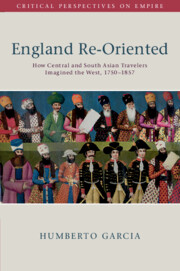
- Cited by 4
-
Cited byCrossref Citations
This Book has been cited by the following publications. This list is generated based on data provided by Crossref.
الندوي, محمد ثناء الله 2021. مرجعيات الاستغراب الهندي النقدي وأسئلة الخصوصية. مجلة كلية الشريعة و الدراسات الإسلامية, Vol. 39, Issue. 2, p. 173.
Garcia, Humberto 2022. The Unsightly Spectacle of “Poor Houseless Wanderers”: De Quincey’sConfessions, the Malaysian Sailor, and Vagrancy. European Romantic Review, Vol. 33, Issue. 4, p. 535.
Kinra, Rajeev 2023. William Jones and Indo-Persian Scholarship. Global Intellectual History, p. 1.
Ebrahimian, Mojtaba 2023. The European other, the Indo-Iranian self and the discourse of wonder in the earliest Persian travelogues of Europe. Studies in Travel Writing, Vol. 26, Issue. 1, p. 34.
- Publisher:
- Cambridge University Press
- Online publication date:
- November 2020
- Print publication year:
- 2020
- Online ISBN:
- 9781108862486




